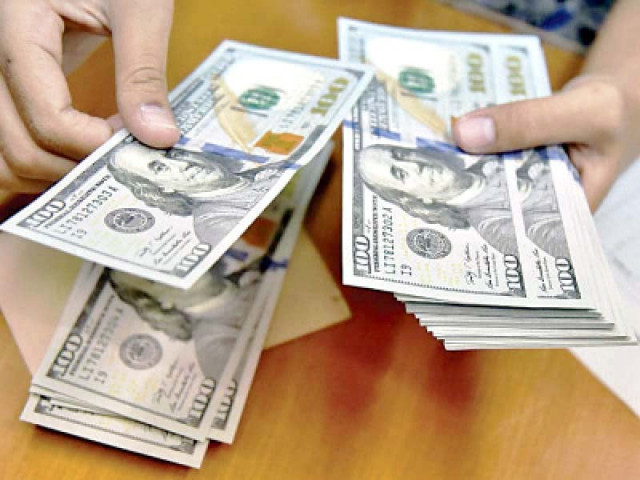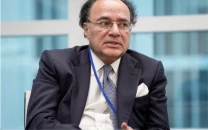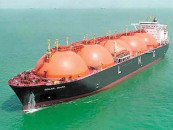Govt to further limit forex purchase
Per day currency purchase, outward remittance limit cut to $5,000

In a major development, the federal government and central bank, on Monday, decided to limit the amount of foreign currency purchased per person and capped the outflow of remittances to $50,000 annually, aimed at reducing the speculations-driven high dollar value in the open market.
It has also been decided that the Federal Investigation Agency (FIA) will be used against those foreign currency dealers involved in speculative currency trading, according to the decisions taken in a meeting between Finance Minister Ishaq Dar and the Governor State Bank of Pakistan (SBP), Jameel Ahmad.
A senior government functionary told the Express Tribune that the per day currency purchase and outward remittance limit has also been cut by half, to $5,000 with a maximum annual cap at $50,000.
The central bank will be issuing a notification shortly to amend the existing exchange companies’ regulations and give effect to these decisions. Finance Minister Ishaq Dar had asked for the meeting with the governor of the central bank after the rupee-dollar value remained over Rs230 to a dollar in the open market. The open market rate was also providing an opportunity to commercial banks to keep the interbank rate in the range of Rs222, far higher than the real inflation adjusted value of the rupee, estimated to be below Rs200 to a dollar.
The official said, during the meeting, SBP Governor Jameel Ahmad also agreed with Dar about the real value of the rupee being below Rs200 to a dollar. The governor, however, was not available for comments.
The dollar, at the interbank, fell by 26 paisas and closed at Rs221.66. The rupee was traded at Rs236 to Rs238 to a dollar in Peshawar, a city bordering Afghanistan and a source of currency smuggling. Last week, Dar sent the Prime Minister’s Special Assistant on Revenue, Tariq Pasha, to Peshawar to find out what was behind the high value of the dollar in the city.
The constant downfall of the local currency also eroded the gains that could be made from the reduction of global crude oil prices, forcing people to pay the highest rates in the Pakistan’s history.
The senior functionary told the Express Tribune that, during the meeting, it was decided that the maximum limit per person, per day to buy foreign currency, in the form of cash or outward remittances from all exchange companies, will be reduced from $10,000 (or its equivalent in other foreign currencies) to $5,000.
Also, the maximum limit per person per calendar year to buy foreign currency, in the form of cash or outward remittances, will also be reduced from $100,000 (or its equivalent in other foreign currencies) to $50,000.
These decisions may help ease pressure on the country’s foreign exchange reserves, currently standing at $8.9 billion, despite bringing foreign trade to a halt, except the import of essential items.
The central bank is examining every letter of credit (LC) valuing over $100,000 for import due to a scarcity of reserves. Once inflows from Saudi Arabia, China and the World Bank start pouring in, however, the position of the foreign currency reserves may improve.
As fines and the suspension of licenses of a few foreign currency dealers were not helping, it was decided that the FIA would be activated against them. The central bank, however, has yet to take a firm action against the commercial banks involved in currency manipulation.
Last month, the FIA arrested four suspects during a crackdown on illegal money changers and hundi-hawala dealers across the country. Three of the suspects were arrested from the Chaman district of Balochistan and one was arrested from Karachi.
Exchange companies purchase foreign currency from customers via outlets spread across Pakistan. This foreign currency, in cash, is subsequently exported out of Pakistan on consignment basis through Cash in Transit (CIT)/ Security Companies.
During the last fiscal year, exchange companies exported $3.1 billion in equivalent foreign currencies and then the US dollars were sold to commercial banks through Nostro Accounts.
In a parliamentary hearing, the central bank had said in September that exchange companies had purchased $4.4 billion from local clients and $2.2 billion were sold in the interbank in the previous fiscal year. An official handout from the finance ministry stated that Dar acknowledged the regulatory role of the SBP in bringing back stability to the exchange rate and showed satisfaction over the current monetary policies being undertaken.
Dar further stated that if the monetary policy always remains in consonance with the fiscal policy, sustainable growth and stability in the economy can be achieved.
According to the finance ministry, the SBP governor said that the government’s continued administrative efforts coupled with the SBP’s policy measures resulted in the rupee value and exchange rate volatility becoming stable.
Dar and the SBP governor also discussed the fiscal and monetary measures being undertaken for economic stability, revival and growth of the country. The coordination of fiscal and monetary policy was also discussed in the meeting.
The SBP governor also apprised the finance minister about the different macroeconomic policy initiatives taken in line with the objectives of fiscal policy to achieve sustainable growth. He said that the SBP is fully committed to supporting the process of economic revival as per the policies of the present government and its mandate statutory.
Published in The Express Tribune, November 8th, 2022.
Like Business on Facebook, follow @TribuneBiz on Twitter to stay informed and join in the conversation.



















COMMENTS
Comments are moderated and generally will be posted if they are on-topic and not abusive.
For more information, please see our Comments FAQ